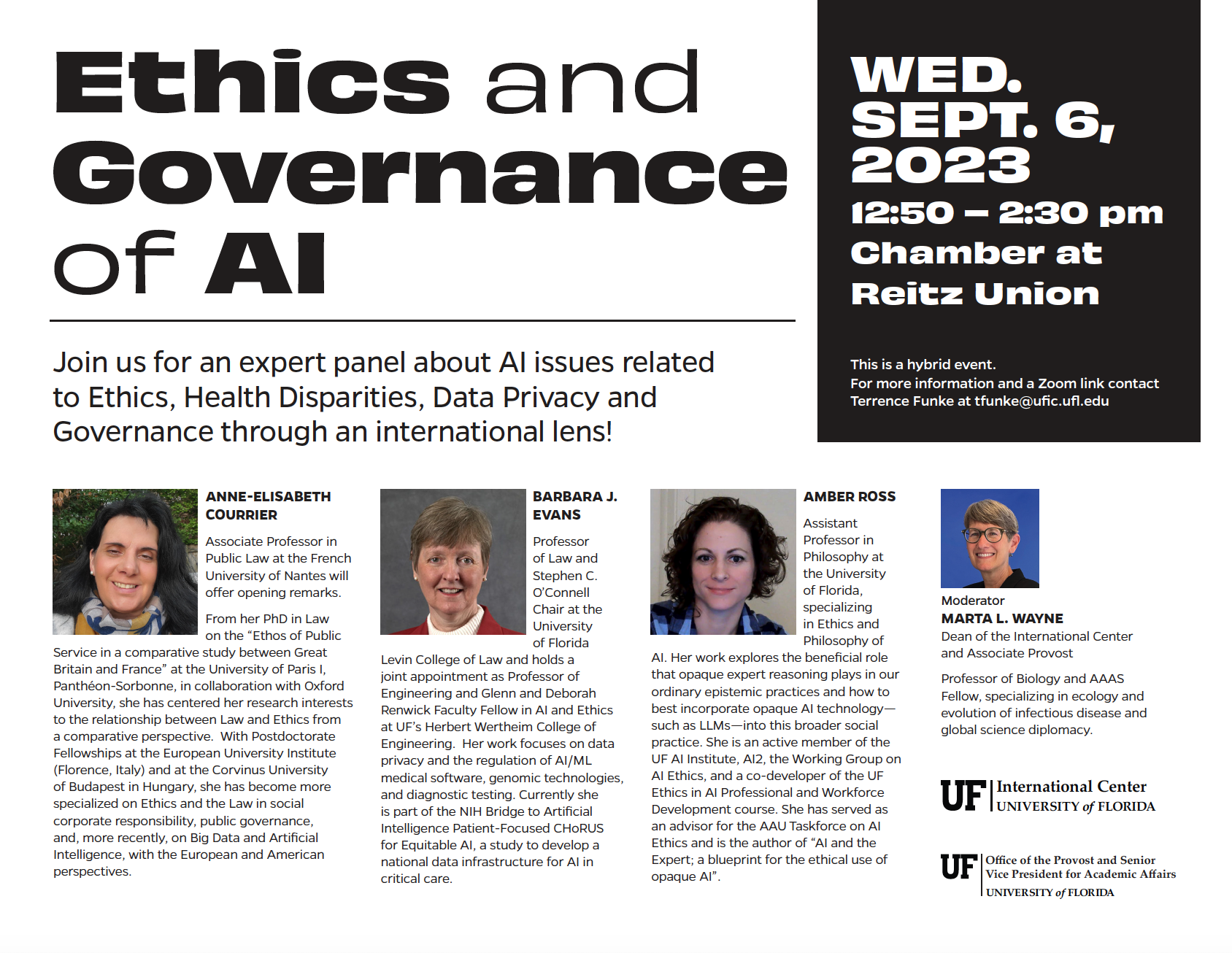Join us for an expert panel about AI issues related to Ethics, Health Disparities, Data Privacy and Governance through an international lens!
This is a hybrid event! For more information and a Zoom link, please contact Terrence Funke at tfunke@ufic.ufl.edu
Panelists:
ANNE-ELISABETH COURRIER
Associate Professor in Public Law at the French University of Nantes will offer opening remarks.
Anne-Elisabeth Courrier is an Associate Professor in Public Law at the French University of Nantes. She joined the Center for Ethics, Emory University in April 2019 as a Visiting Fellow. From her PhD in Law on the “Ethos of Public Service in a comparative study between Great Britain and France” at the University of Paris I, Panthéon-Sorbonne, in collaboration with Oxford University, she has centered her research interests to the relationship between Law and Ethics from a comparative perspective. With Postdoctorate Fellowships at the European University Institute (Florence, Italy) and at the Corvinus University of Budapest in Hungary, she has become more specialized on Ethics and the Law in social corporate responsibility, public governance, and, more recently, on Big Data and Artificial Intelligence, with the European and American perspectives. Taking part in the French Research group Data-Santé and working with the French Laboratory “Droit et Changement Social” (Law and societal changes)(UMR CNRS 6297), she is, within the Emory Center for Ethics, involved in different perspectives of collaboration between universities to help students and academic teams benefit from the diversity of approaches and the exchange agreements she deeply enjoyed when she was a student.
Courrier also loves teaching, especially through innovative channels and was awarded with the Nantes University, the 2017 Price for Passion in Pedagogy in Higher Education (PEPS) from the French Ministry of Higher Education, Innovation and Research for simulations on the European Council where students had to play the role of journalists, lobbyists and European Heads of Government, to negotiate a common position on a given topic.
BARBARA J. EVANS
Barbara J. Evans is Professor of Law and Stephen C. O’Connell Chair at the University of Florida Levin College of Law and holds a joint appointment as Professor of Engineering and Glenn and Deborah Renwick Faculty Fellow in AI and Ethics at UF’s Herbert Wertheim College of Engineering. Her work focuses on data privacy and the regulation of AI/ML medical software, genomic technologies, and diagnostic testing. Currently she is part of the NIH Bridge to Artificial Intelligence Patient-Focused CHoRUS for Equitable AI, a study to develop a national data infrastructure for AI in critical care. She is an elected member of the American Law Institute, a Senior Member of the Institute of Electrical and Electronics Engineers and was named a Greenwall Foundation Faculty Scholar in Bioethics for 2010-2013. Before coming to academia, she was a partner in the international regulatory practice of a large New York law firm and is admitted to the practice of law in New York and Texas. She holds a BS in electrical engineering from the University of Texas at Austin, an MS & PhD from Stanford University, a JD from Yale Law School, an LLM in Health Law from the University of Houston Law Center, and she completed a post-doctoral fellowship in Clinical Ethics at the MD Anderson Cancer Center.
DR. AMBER ROSS
Dr. Amber Ross is an Assistant Professor in Philosophy at the University of Florida, specializing in Ethics and Philosophy of AI. Her work explores the beneficial role that opaque expert reasoning plays in our ordinary epistemic practices and how to best incorporate opaque AI technology—such as LLMs—into this broader social practice. She is an active member of the UF AI Institute, AI2, the Working Group on AI Ethics, and a co-developer of the UF Ethics in AI Professional and Workforce Development course. She has served as an advisor for the AAU Taskforce on AI Ethics and is the author of “AI and the Expert; a blueprint for the ethical use of opaque AI”.

